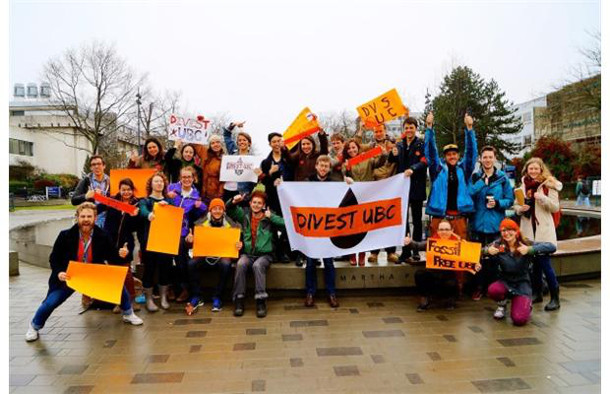The University of British Columbia's board of governors' decision to create a Sustainable Future Fund rather than scrap the university's fossil fuel investments was a far-from-satisfactory resolution for many of the students and faculty who voted in favour of divestment.
''It's pretty shocking when a university chooses to ignore the expressed will of both its students and faculty,'' said Alex Hemingway, a UBC PhD student and divestment coordinator with the UBCC350 environmental activist group.
The board has deliberated on divestment since April 2014, when the student union first voted in a referendum in favour of divesting the university's $1.4-billion endowment fund from fossil fuel companies.
That same month, the board announced another referendum was required, leading to a 2015 faculty referendum where over 60 per cent voted in favour of divestment.
Yesterday, the board voted in favour of creating a separate Sustainable Future Fund, with a seed of $10 million from UBC's $193-million Trek Endowment, saying it would have more of an impact on climate change than divestment.
The new fund is restricted to a two per cent investment in carbon producers and only environmentally, socially, and corporately responsible companies.
But UBCC350 quickly panned the decision, claiming the board's deliberations didn't include consultation with students, faculty or staff, and occurred mostly behind closed doors.
''If we had had an opportunity to go into a more serious investigation of the issue with the board, I'm hoping some of them would have come around. But we haven't seen that yet and that's what we've been asking for,'' Hemingway said.
Low turnout at votes: board
The board countered that UBC support for divestment is suspect because only about 20 per cent of students and faculty actually voted.
''We didn't have a counter-petition or referendum on not divesting,'' said Philip Steenkamp, vice president external relations and communications, who spoke on the board's behalf.
Both sides are seeking to address climate change, he added, but there are different views on how best to do it.
While the board can't move investments from the endowment to the new fund, Steenkamp said current investors have the option to move their money, and the school will encourage new investors to consider the fund.
Hemingway said turnout for the divestment votes was consistent with any student union election. The Tyee reached out to the Alma Mater Society, UBC's undergraduate student union, for comment, but as it is reading week no one was available.
The Sustainable Investment Fund is a drop in the bucket compared to the university's fossil fuel investments, Hemingway said.
''We're talking about a $10-million fund that is emblematic of the type of hand-waving and half-measures that we see in responses to climate change, both here at the university and more broadly in Canada. What we actually need is emphatic, dramatic action now.''
Fight not over, vows campaigner
Fossil fuels encompass a small portion of the $1.4-billion endowment fund: approximately $85 million of the endowment is invested in energy corporations, and $41 million of that is invested in companies that climate campaigners want UBC to divest from over five years.
But divestment isn't consistent with the board's fiduciary responsibility to the university to get the most out of their investments, which in turn support students' scholarships and bursaries, Steenkamp said.
''We can be an active investor and work with companies in helping them improve their practice over time,'' he said, noting that some energy companies like Shell invest in renewable energy research.
For its part, UBCC350 believes taking money away from fossil fuel companies could force change.
''If a company began agreeing to the fact that they had to leave 80 per cent of their fossil fuel reserves in the ground, then we should talk about taking them off the [divestment] list and allow investments again,'' Hemingway said.
The board sought legal advice from law firm Koskie Minsky on whether the divestment proposal met the university's Endowment Responsible Investment Policy divestment criteria, and based yesterday's decision on the firm’s advice.
According to Hemingway, the firm didn't conclude that divestment from fossil fuels is inconsistent with fiduciary duties, but that the divestment proposal didn't provide the necessary alternative: higher-return investment suggestions for replacing money lost from divesting in fossil fuels.
That's why the students proposed taking five years to divest to allow time to identify more ethical investment alternatives to fossil fuels, Hemingway added.
''That would give time for more fossil-free pooled funds to emerge on the market. There are a few in Canada already… and there are more that are going to be coming online.''
Hemingway noted the fight is not over: UBCC350 is considering shelling out for a legal analysis of the board's decision, as well as asking UBC alumni to withhold donations until the school divests.
No post-secondary institution or pension plan in Canada has yet divested from fossil fuels, though many, including Dalhousie University, McGill University, and the Ontario Teachers' Pension Plan have considered it. The University of Toronto's president is expected to make a decision on divestment this spring.
According to Fossil Free, an umbrella organization of divestment campaigns, over 500 organizations worldwide, including universities and schools, churches, foundations, and pension funds have committed to divest $3.4 trillion from fossil fuel companies. ![]()
















Tyee Commenting Guidelines
Comments that violate guidelines risk being deleted, and violations may result in a temporary or permanent user ban. Maintain the spirit of good conversation to stay in the discussion.
*Please note The Tyee is not a forum for spreading misinformation about COVID-19, denying its existence or minimizing its risk to public health.
Do:
Do not: